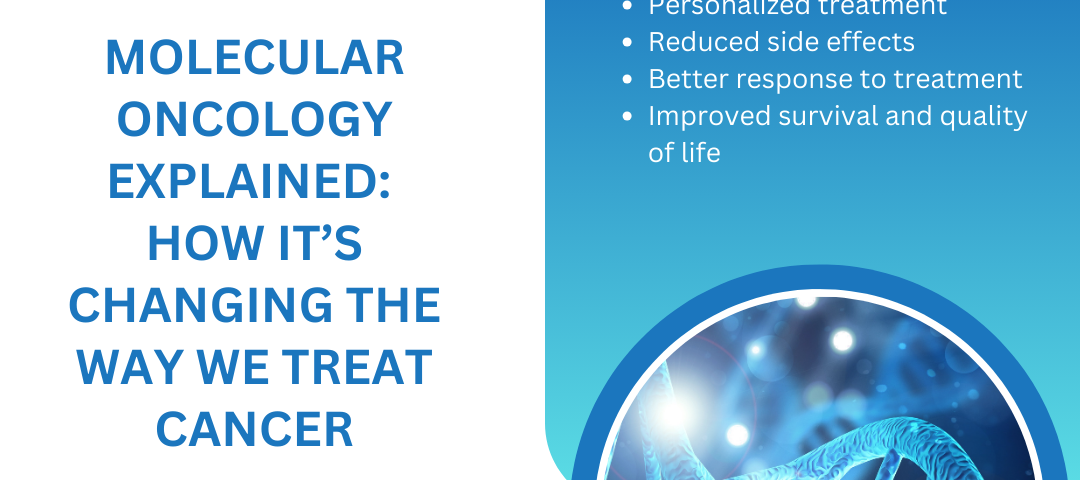Introduction: A New Era in Cancer Care
In recent years, cancer treatment has undergone a revolutionary shift—thanks to the rise of molecular oncology. Gone are the days of one-size-fits-all treatments. Today, doctors like Dr. Pritam Kataria are using highly advanced genomic profiling and molecular testing to develop personalized cancer therapies that are more effective and less harmful.
But what exactly is molecular oncology? How does it work, and why is it becoming a game-changer in cancer care?
Let’s break it down in simple terms.
What is Molecular Oncology?
Molecular oncology is a branch of oncology that focuses on the genetic and molecular changes in cells that cause cancer. Instead of looking at tumors just under a microscope, doctors now study DNA mutations, gene expressions, and protein behavior within cancer cells.
By understanding the unique genetic blueprint of each cancer, oncologists can select treatments that specifically target those abnormalities. This approach is known as personalized or precision medicine.
Why is Molecular Oncology Important?
Traditional cancer treatments like chemotherapy and radiation therapy often affect both cancerous and healthy cells. This can lead to unwanted side effects.
Molecular oncology changes that by helping doctors:
- Identify driver mutations (changes in genes that cause cancer to grow)
- Select targeted therapies that block those specific mutations
- Predict treatment response based on genetic markers
- Avoid unnecessary treatments that are unlikely to work
- Improve survival rates and reduce side effects
How Molecular Oncology Works: The Process
- Tissue or Liquid Biopsy:
A sample of the tumor or blood is collected. - Molecular Testing / Genomic Sequencing:
The sample is tested to look for mutations, gene fusions, amplifications, or protein expressions. - Molecular Tumor Board (Optional):
In complex cases, a team of oncologists and geneticists review the findings to suggest personalized treatment plans. - Targeted Treatment Plan:
Based on the test results, the patient receives drugs that are specifically designed to target their tumor’s molecular signature.
Common Genetic Mutations in Cancer
Some well-known mutations and targets in cancer include:
- EGFR (common in lung cancer)
- HER2 (breast and gastric cancers)
- BRAF (melanoma and colorectal cancer)
- ALK/ROS1 fusions (lung cancer)
- BRCA1/BRCA2 (breast and ovarian cancer)
Identifying these mutations allows oncologists to prescribe targeted therapies such as tyrosine kinase inhibitors, monoclonal antibodies, or immunotherapies.
Applications of Molecular Oncology in Different Cancers
- Breast Cancer: HER2 testing guides the use of trastuzumab.
- Lung Cancer: EGFR and ALK testing determine the use of specific inhibitors.
- Colorectal Cancer: KRAS mutation testing predicts resistance to certain drugs.
- Leukemia & Lymphoma: Genetic markers define subtypes and guide treatment intensity.
Frequently Asked Questions (FAQs)
Q1: Is molecular testing painful or risky?
A: No. The tests are done on blood (liquid biopsy) or tumor tissue (from a biopsy or surgery). There’s minimal risk involved.
Q2: Is molecular testing done for all cancer patients?
A: Not always. It’s usually recommended for advanced-stage cancers, rare cancers, or when the standard treatment isn’t working.
Q3: Does insurance cover these tests?
A: In many cases, yes—especially if the test is recommended as part of standard cancer care. However, it varies by provider and country.
Q4: Can targeted therapy replace chemotherapy?
A: In some cases, yes. But for others, it may be used alongside chemotherapy or immunotherapy depending on the cancer type and stage.
Q5: Is this the same as genetic testing for inherited cancer risk?
A: Not exactly. Molecular oncology looks at acquired mutations in cancer cells, while inherited cancer testing checks for mutations passed through families.
Advantages of Molecular Oncology
✅ More accurate diagnosis
✅ Personalized treatment
✅ Reduced side effects
✅ Better response to treatment
✅ Improved survival and quality of life
Challenges and Limitations
🔸 Not all tumors have targetable mutations
🔸 High cost of testing and targeted drugs
🔸 Access to specialized labs and oncologists
🔸 Resistance may develop over time
🔸 Requires regular monitoring
Despite these challenges, molecular oncology is rapidly evolving, and many new drugs and tests are being approved each year.
CIs Molecular Oncology Right for You?
If you or a loved one has been diagnosed with cancer—especially an advanced or rare type—talk to your oncologist about molecular testing. It could open the door to cutting-edge treatments that are personalized just for you.
At Dr. Pritam Kataria’s Oncology Clinic, we use advanced molecular tools to guide precise, effective cancer care. Book a consultation today to learn how we can help.



